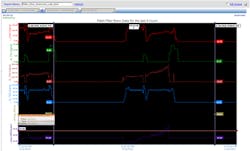Craft Brewer Leverages Software to Tap into Manufacturing Intelligence
Production failures carry a high cost: in time, in wasted material and in reduced throughput. Those failures result from a complex net of process variables that every enterprise tries to better control and manage, but which are often difficult to see – much less act upon.
Recently, a craft brewer in the Pacific Northwest recognized the need for better insight into all the variables that affect their brewing process. The brewery was installing a new piece of filtration equipment and management sought a local company to support the project. As part of the project scope, a manufacturing intelligence strategy was deployed that would increase manufacturing visibility, reduce cost, and improve product quality and consistency.
The brewer had been using a primarily manual process to mix, filter and remove the sweet wort liquid that would eventually be turned into beer. During the mixing process, where so much of the brew’s flavor, color and aroma are determined, the brewer had little insight into process variables like pressure, flow, temperature and their effect on quality during the process (i.e. a temperature of “x” at “y” time during the process creates “z” result.)
Nor could they easily create comparisons between batches. So, while brewers were able to identify variances in the product during the quality phase of its operation, they were unable to perform real-time adjustments that would optimize product quality and consistency, critical for the brewery to keep up with market demand in their fast-growing business.
The brewer chose Portland, Oregon-based Aurora Industrial Automation and its partner, Rockwell Automation, to help successfully install and start-up the new systems through ramp up to full production.
Aurora provides complex industrial control to the pulp/paper, life science and packaging processing industries. After a thorough assessment phase, Aurora designed the control systems for the critical part of the brewing process (raking and filtering) and architected a network that would leverage a trio of software products from Rockwell Automation:
• FactoryTalk Historian software provides fast and reliable data capture to help the brewer reduce variability and create an accurate online record of production parameters;
• FactoryTalk View software provides an easy-to-use interface to visualize system information and trends;
• FactoryTalk VantagePoint correlates information captured from a range of systems – the control system, historian, FDA data—that previously had to be handwritten and aggregated from separate spreadsheets, enabling the brewer to make decisions to optimize production.
“The FactoryTalk applications from Rockwell Automation enable our client to monitor data in real time so they can address issues as they occur, review past events to create comparisons between product runs, and perform necessary maintenance and corrective actions,” said Fred Bossard, President of Aurora Industrial Automation.
For example, the new system enables the brewer to track how a pressure variance (caused by mash density variances) affects product quality and make inline corrections to improve throughput. But when that same pressure information can be correlated to outlet flow or buffer tank level, he can also better plan and execute machine maintenance activities. The system enables operators to pass information accurately between shifts with a permanent record that can be relied upon for regulatory compliance purposes. The master brewer can watch multiple variables at different phases of the production process all from a single position, rather than patrolling the plant floor.
As a result of the implementation, the brewery was able to increase throughput from four batches on a 12 to14-hour shift, to five batches on a ten-hour shift. This dramatic increase in output – upwards of 60 percent – has been critical in enabling the brewer to meet nationwide sales targets. In addition, filtration process improvements have resulted in more efficient water usage at the plant, and reduced the weight of spent grain that needs to be shipped away from the plant, further increasing profits.
“All too often, there is a brick wall between the business and plant floor sides of manufacturing that no one can see through,” said Bossard. “We leverage the vast array of Rockwell Automation products to deliver process control systems paired with visualization and information software. FactoryTalk software enables our clients to break down that wall, helping them to overcome visibility, migration and integration hurdles so they can improve their operations—and their bottom line. In this case, we helped the master brewer focus on what is truly important, making a high quality brew.”
To view the on-demand webcast, please visit: http://discover.rockwellautomation.com/IS_EN_Webcasts_mi_in_action_webcast_aurora.aspx
For more information on manufacturing intelligence, please visit: http://discover.rockwellautomation.com/IS_EN_Intelligence_Manufacturing_Intelligence.aspx
Allen-Bradley, ControlLogix, FactoryTalk, Rockwell Automation and Rockwell Software are trademarks of Rockwell Automation, Inc. Trademarks not belonging to Rockwell Automation are property of their respective companies.

